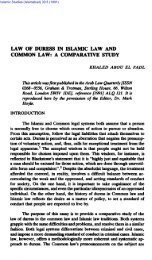ORPHANED GRANDCHILDREN IN ISLAMIC SUCCESSION LAW
ORPHANED GRANDCHILDREN IN ISLAMIC SUCCESSION LAW
ORPHANED GRANDCHILDREN IN ISLAMIC SUCCESSION LAW
You also want an ePaper? Increase the reach of your titles
YUMPU automatically turns print PDFs into web optimized ePapers that Google loves.
ORPHANgD <strong>GRANDCHILDREN</strong> <strong>IN</strong> <strong>ISLAMIC</strong> SUCCESSlON <strong>LAW</strong> 261<br />
example, that it is more commendable to provide by legacy for a<br />
disabled infant rather than an adult well-settled in life and that<br />
these factors should take precedence over whether they are grand-<br />
children or grand-nephews. If. on the other hand, obligatory<br />
bequests are based on the assumption that the propositus intended<br />
to provide for his orphaned grandchildren, this assumption can<br />
only survive in the absence of specific evidence to the contrary.<br />
But supposing the propositus actually made provision by will for<br />
his orphaned grandchild to the extent of, say, one-twelfth of his<br />
estate, then it is clearly absurd to assume that any oversight has<br />
occurred. He remembered his orphaned grandchild and provided<br />
one-twelfth of his estate for him on what, in the particular circum-<br />
stances of the case, appeared good and sufficient reasons. Yet the<br />
law, under the system of obl4gatory bequests, steps in after his<br />
death to alter his testamentary dispositions, raising the legacy to<br />
the grandchild to one-third of the estate (or the equivalent of the<br />
predeceased father's share, whichever is less) at the expense of<br />
other legacies or the living son of the propositus who may have<br />
been in greater need of the remaining 11/12ths. These are the<br />
contradictions which arise when the orphaned grandchild's provision<br />
is based on assumption or need instead of his rights. It is not<br />
difficult to imagine such good and sufficient reasons for the<br />
propositus acting as he did when the living son is physically handi-<br />
capped or mentally retarded while the orphaned grandson has<br />
attained his majority and has already received an adequate amount<br />
from his own father's estate.<br />
The system of obligatory bequests leaves unanswered the basis<br />
on which orphaned grandchildren are to be provided for. Are they<br />
provided for on the grounds that they are:close relatives of the<br />
deceased (inexplicably omitted, directly or by implication, in the<br />
Qur'snic verses on inheritance) whom it is inconceivable should be<br />
deprived of a portion of the estate because of this close relationship?<br />
Or, are they merely distant relatives who are to be provided for on<br />
compassionate grounds ? Either position raises serious difficulties<br />
when treated as an obligatory bequest.<br />
An obligatory bequest introduces an entirely new element<br />
into the very principles of Islamic succession. being neither<br />
a legacy nor an inheritance, neither testate nor intestate. and<br />
the unavoidable uncertainty about how it should be regarded<br />
is bound to raise in course of time far more difficulties than it.
















